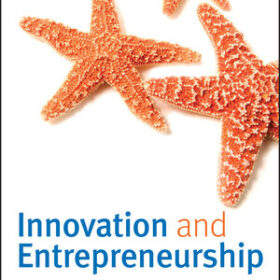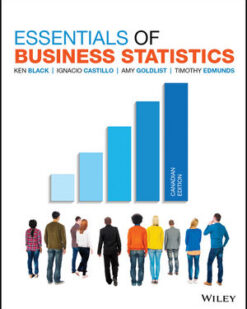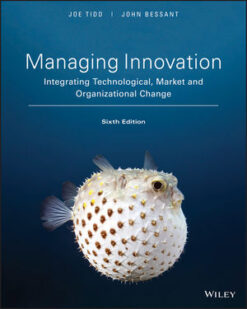Description
Chapter 1 Why Ethics Matter
Introduction
1.1 Being a Professional of Integrity
1.2 Ethics and Profitability
1.3 Multiple versus Single Ethical Standards
Summary
Key Terms
Assessment Questions
End Notes
Chapter 2 Ethics from Antiquity to the Present
Introduction
2.1 The Concept of Ethical Business in Ancient Athens
2.2 Ethical Advice for Nobles and Civil Servants in Ancient China
2.3 Comparing the Virtue Ethics of East and West
2.4 Utilitarianism: The Greatest Good for the Greatest Number
2.5 Deontology: Ethics as Duty
2.6 A Theory of Justice
Summary
Key Terms
Assessment Questions
End Notes
Chapter 3 Defining and Prioritizing Stakeholders
Introduction
3.1 Adopting a Stakeholder Orientation
3.2 Weighing Stakeholder Claims
3.3 Ethical Decision-Making and Prioritizing Stakeholders
3.4 Corporate Social Responsibility (CSR)
Summary
Key Terms
Assessment Questions
End Notes
Chapter 4 Three Special Stakeholders: Society, the Environment, and Government
Introduction
4.1 Corporate Law and Corporate Responsibility
4.2 Sustainability: Business and the Environment
4.3 Government and the Private Sector
Summary
Key Terms
Assessment Questions
End Notes
Chapter 5 The Impact of Culture and Time on Business Ethics
Introduction
5.1 The Relationship between Business Ethics and Culture
5.2 Business Ethics over Time
5.3 The Influence of Geography and Religion
5.4 Are the Values Central to Business Ethics Universal?
Summary
Key Terms
Assessment Questions
End Notes
Chapter 6 What Employers Owe Employees
Introduction
6.1 The Workplace Environment and Working Conditions
6.2 What Constitutes a Fair Wage?
6.3 An Organized Workforce
6.4 Privacy in the Workplace
Summary
Key Terms
Assessment Questions
End Notes
Chapter 7 What Employees Owe Employers
Introduction
7.1 Loyalty to the Company
7.2 Loyalty to the Brand and to Customers
7.3 Contributing to a Positive Work Atmosphere
7.4 Financial Integrity
7.5 Criticism of the Company and Whistleblowing
Summary
Key Terms
Assessment Questions
End Notes
Chapter 8 Recognizing and Respecting the Rights of All
Introduction
8.1 Diversity and Inclusion in the Workforce
8.2 Accommodating Different Abilities and Faiths
8.3 Sexual Identification and Orientation
8.4 Income Inequalities
8.5 Animal Rights and the Implications for Business
Summary
Key Terms
Assessment Questions
End Notes
Chapter 9 Professions under the Microscope
Introduction
9.1 Entrepreneurship and Start-Up Culture
9.2 The Influence of Advertising
9.3 The Insurance Industry
9.4 Ethical Issues in the Provision of Health Care
Summary
Key Terms
Assessment Questions
End Notes
Chapter 10 Changing Work Environments and Future Trends
Introduction
10.1 More Telecommuting or Less?
10.2 Workplace Campuses
10.3 Alternatives to Traditional Patterns of Work
10.4 Robotics, Artificial Intelligence, and the Workplace of the Future
Summary
Key Terms
Assessment Questions
End Notes
Chapter 11 Epilogue: Why Ethics Still Matter
Introduction
11.1 Business Ethics in an Evolving Environment
11.2 Committing to an Ethical View
11.3 Becoming an Ethical Professional
11.4 Making a Difference in the Business World
End Notes
Appendix A The Lives of Ethical Philosophers
Appendix B Profiles in Business Ethics: Contemporary Thought Leaders
Appendix C A Succinct Theory of Business
Introduction
1.1 Being a Professional of Integrity
1.2 Ethics and Profitability
1.3 Multiple versus Single Ethical Standards
Summary
Key Terms
Assessment Questions
End Notes
Chapter 2 Ethics from Antiquity to the Present
Introduction
2.1 The Concept of Ethical Business in Ancient Athens
2.2 Ethical Advice for Nobles and Civil Servants in Ancient China
2.3 Comparing the Virtue Ethics of East and West
2.4 Utilitarianism: The Greatest Good for the Greatest Number
2.5 Deontology: Ethics as Duty
2.6 A Theory of Justice
Summary
Key Terms
Assessment Questions
End Notes
Chapter 3 Defining and Prioritizing Stakeholders
Introduction
3.1 Adopting a Stakeholder Orientation
3.2 Weighing Stakeholder Claims
3.3 Ethical Decision-Making and Prioritizing Stakeholders
3.4 Corporate Social Responsibility (CSR)
Summary
Key Terms
Assessment Questions
End Notes
Chapter 4 Three Special Stakeholders: Society, the Environment, and Government
Introduction
4.1 Corporate Law and Corporate Responsibility
4.2 Sustainability: Business and the Environment
4.3 Government and the Private Sector
Summary
Key Terms
Assessment Questions
End Notes
Chapter 5 The Impact of Culture and Time on Business Ethics
Introduction
5.1 The Relationship between Business Ethics and Culture
5.2 Business Ethics over Time
5.3 The Influence of Geography and Religion
5.4 Are the Values Central to Business Ethics Universal?
Summary
Key Terms
Assessment Questions
End Notes
Chapter 6 What Employers Owe Employees
Introduction
6.1 The Workplace Environment and Working Conditions
6.2 What Constitutes a Fair Wage?
6.3 An Organized Workforce
6.4 Privacy in the Workplace
Summary
Key Terms
Assessment Questions
End Notes
Chapter 7 What Employees Owe Employers
Introduction
7.1 Loyalty to the Company
7.2 Loyalty to the Brand and to Customers
7.3 Contributing to a Positive Work Atmosphere
7.4 Financial Integrity
7.5 Criticism of the Company and Whistleblowing
Summary
Key Terms
Assessment Questions
End Notes
Chapter 8 Recognizing and Respecting the Rights of All
Introduction
8.1 Diversity and Inclusion in the Workforce
8.2 Accommodating Different Abilities and Faiths
8.3 Sexual Identification and Orientation
8.4 Income Inequalities
8.5 Animal Rights and the Implications for Business
Summary
Key Terms
Assessment Questions
End Notes
Chapter 9 Professions under the Microscope
Introduction
9.1 Entrepreneurship and Start-Up Culture
9.2 The Influence of Advertising
9.3 The Insurance Industry
9.4 Ethical Issues in the Provision of Health Care
Summary
Key Terms
Assessment Questions
End Notes
Chapter 10 Changing Work Environments and Future Trends
Introduction
10.1 More Telecommuting or Less?
10.2 Workplace Campuses
10.3 Alternatives to Traditional Patterns of Work
10.4 Robotics, Artificial Intelligence, and the Workplace of the Future
Summary
Key Terms
Assessment Questions
End Notes
Chapter 11 Epilogue: Why Ethics Still Matter
Introduction
11.1 Business Ethics in an Evolving Environment
11.2 Committing to an Ethical View
11.3 Becoming an Ethical Professional
11.4 Making a Difference in the Business World
End Notes
Appendix A The Lives of Ethical Philosophers
Appendix B Profiles in Business Ethics: Contemporary Thought Leaders
Appendix C A Succinct Theory of Business






